Digitalization: Making the Metals and Mining Industry More Agile and Efficient
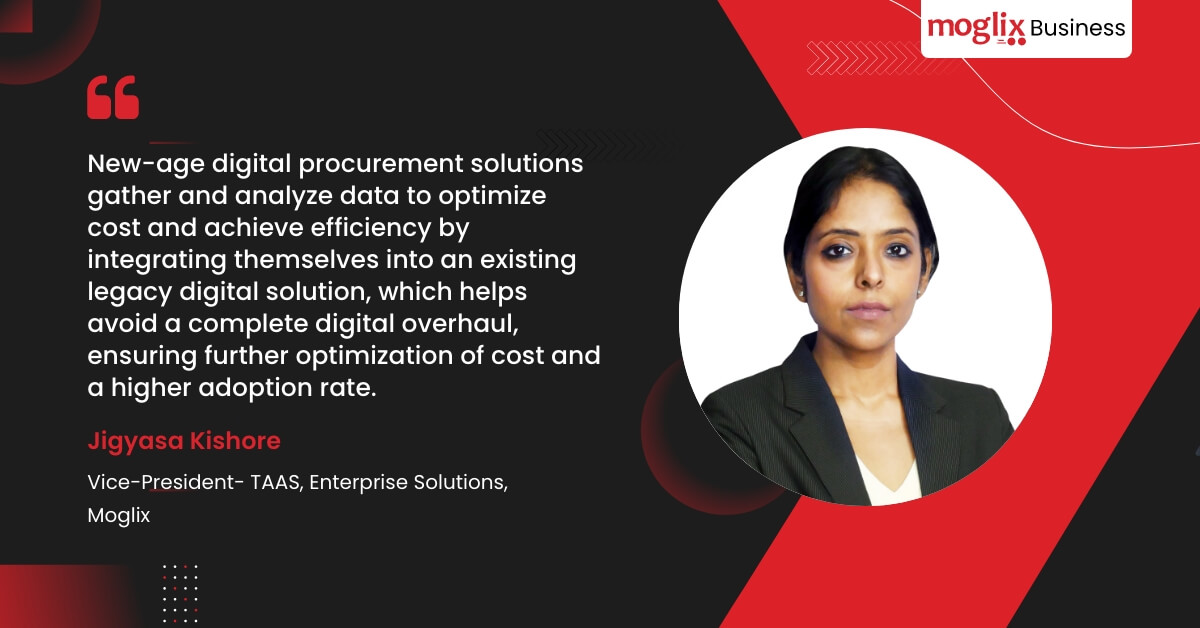
Digitalization: Making the Metals and Mining Industry More Agile and Efficient
The metals & mining industry forms the core of industrial development as it provides elementary raw materials for most of the downstream industries like power, steel, cement, aluminum, etc. The metals and mining industry has been dogged by several persistent issues like geological uncertainty, market volatility, operational hazards, etc. Though miners have been one of the early adopters of technological or digital advances most of those digital efforts were on improving operations and not process-oriented areas such as procurement and supply chain. As a result, even the digital leaders of the industry are relatively 30% less digitally mature as compared to their counterparts in the chemical and automotive industries.
According to a DAI survey, manual and fragmented procurement cycles are still a norm in nearly 75% of companies.
A paradigm shift in Fashion Industry is connecting the loose ends
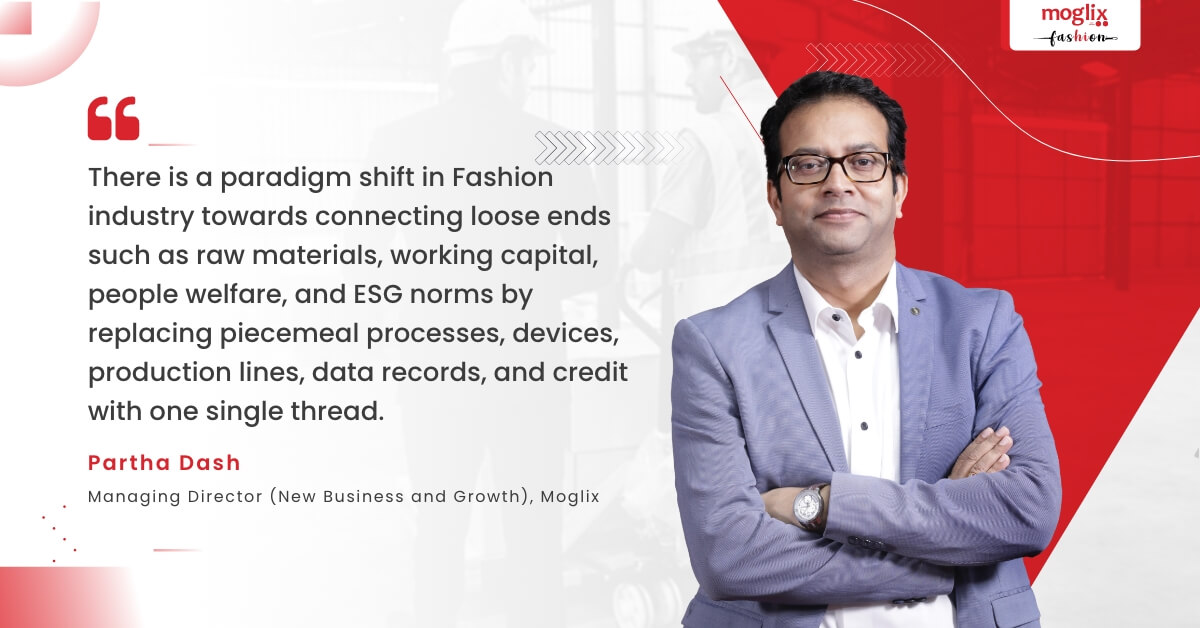
A paradigm shift in Fashion Industry is connecting the loose ends
How unpredictable can things get in the fashion industry supply chain? In 2019 India’s fashion and apparel industry was projected to grow to $59.3 billion by 2022. And then, the COVID19 pandemic struck. Now with the end of the pandemic in sight, the Indian fashion industry has bounced back better to reach revenues worth $87.6 billion in 2022 and is estimated to grow to $102.6 billion by 2026. What explains the roller coaster ride that the Indian fashion industry supply chain is on? Outlined below are some risks and the inherent opportunities in addressing them:
Demand Diversity Across Geographies, Cultures, and Time: Fashion choices can change depending on geography, culture, and time of the year. To elaborate, people in cool climates prefer jackets, coats, gloves, scarves, earmuffs, and warm undergarments.
Moglix expands its distribution footprint with 100 % acquisition of ADI India

Moglix expands its distribution footprint with 100 % acquisition of ADI India
India’s B2B e-commerce and digital supply chain solutions pioneer, Moglix today announced the acquisition of ADI’s India distribution business to spread its arms further into industrial goods distribution. ADI’s India business represents the Indian distribution arm of ADI Global Distribution, a leading global wholesale distributor of security, AV and low-voltage products, which is part of Resideo Technologies, Inc.
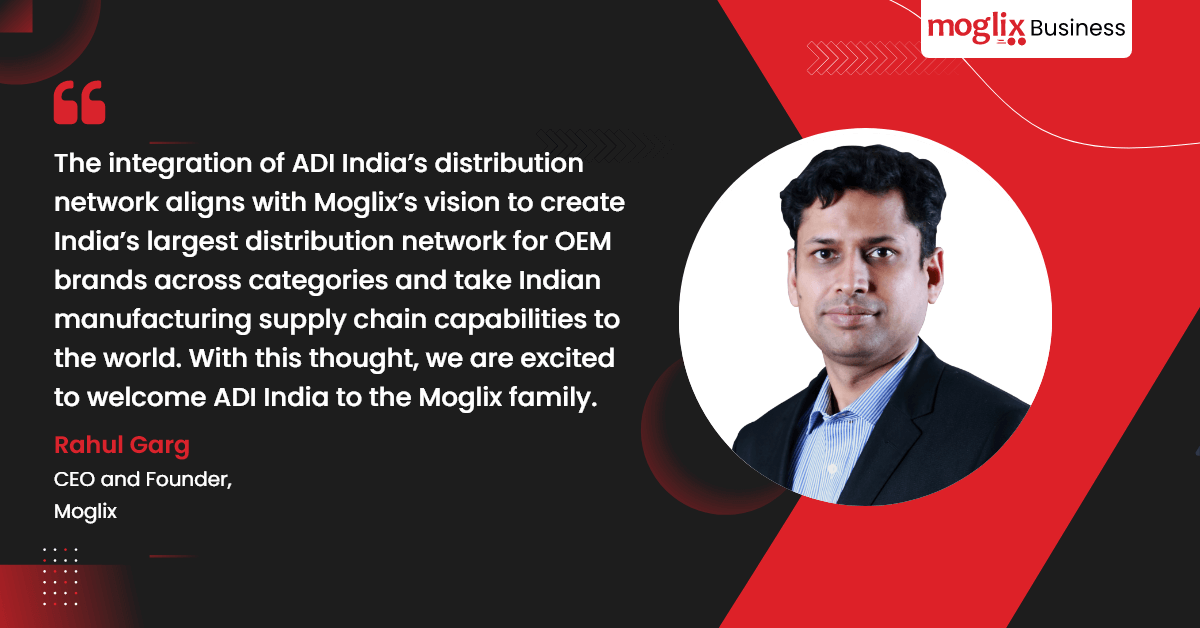
Moglix has acquired ADI’s India distribution business with an aim to strengthen its product portfolio across video surveillance, access control and fire control products. Moglix will integrate all ADI India’s offerings, sales partnerships, on-ground assets and the workforce into its global supply chain ecosystem. With this acquisition, Moglix is leveraging the capital and expertise to further scale up the assortment strength, and category depth of the company’s catalogue by 2X.
“ADI India’s addition to Moglix ecosystem enables synergies through their on- ground customer touch points and distribution footprint combined with our asset-light digital-first approach and touchless supply chain processes.”,
adds Partha
Digitalization is the next frontier for product procurement
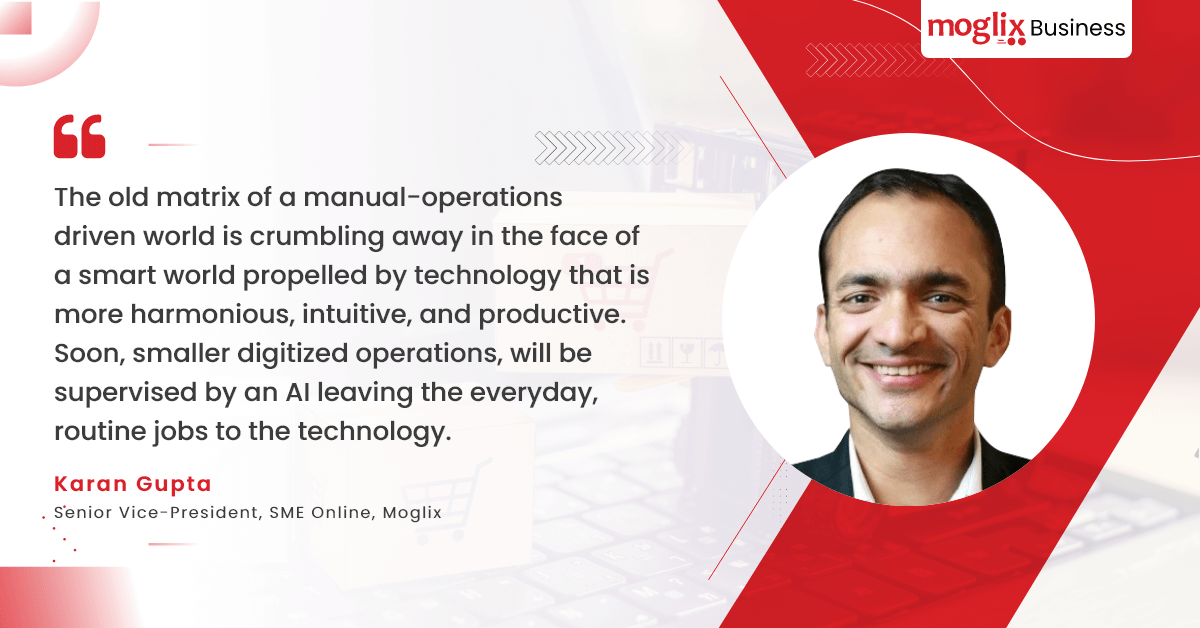
Digitalization is the next frontier for product procurement
A silent revolution is underfoot in India, apparent in India’s expanding scope of Digitalization of MSMEs. Be it a mom-and-pop store, a hole-in-the-wall shop, or a mid-sized firm that runs factories and employs hundreds of workers, more and more business entities are starting to realize that running an agile business without embracing the new digital paradigm is impossible.
The Digitalization endeavor underway in the country in varied sectors like agriculture, education, labor, logistics, energy, financial services, and many more are likely to create economic value of anywhere between $10 to $150 billion by 2025.
“Digitization for a firm should include, within its scope, numerous operations like the purchase of goods and services, vendor shortlisting, purchase agreements, inventory management, monitoring of cash cycles,”
adds Karan
Decoding Moglix’s Success and Acquisition Strategy
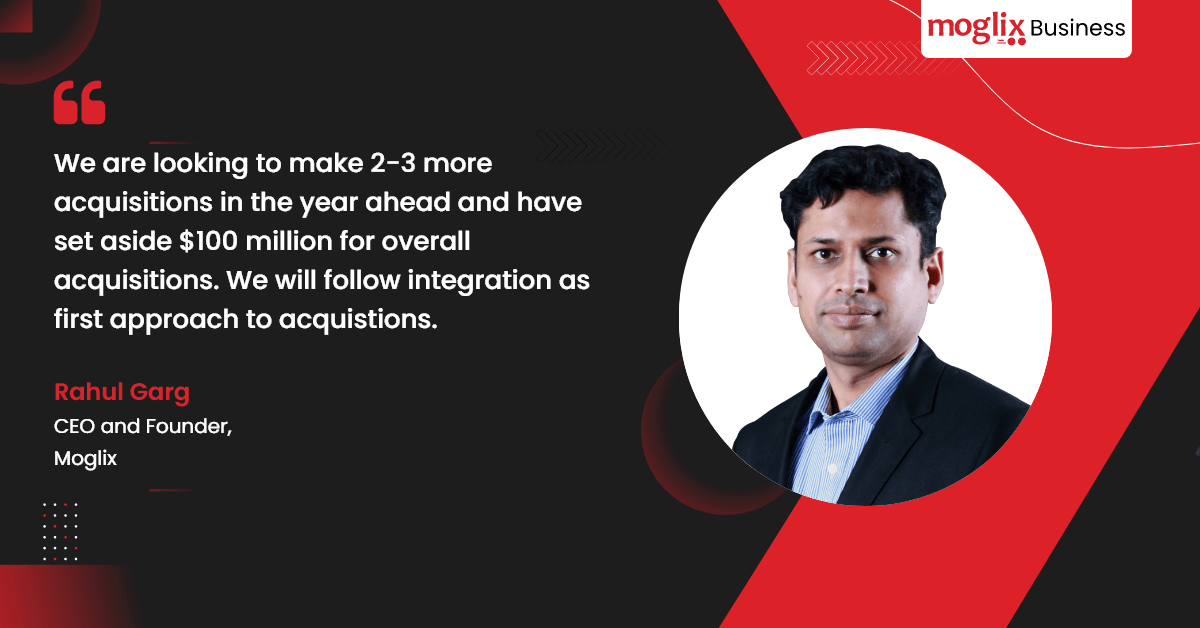
Decoding Moglix’s Success and Acquisition Strategy
In the recent interaction with Rahul Garg, Mint covers Industrial goods marketplace Moglix, that counts Sequoia Capital, Tiger Global and Accel Partners among its investors. The company has earmarked $100 million (Rs 814 crore) as part of its strategy to acquire up to three companies in the next 12 months.
Moglix launched in February 2021 the digital supply chain financing platform Credlix, which acquired trade financing focused fintech startup NuPhi for an undisclosed amount in November. Last year, Moglix also bought machinery marketplace Vendaxo.
“In terms of our global expansion plans, we have entered the UAE market last year and we are looking to foray into two more emerging markets. We are also looking deeper into Indian micro markets, which comprises energy, electric vehicles, hydrogen and solar verticals,”
adds Rahul Garg
Reengineering the Automotive Supply chain
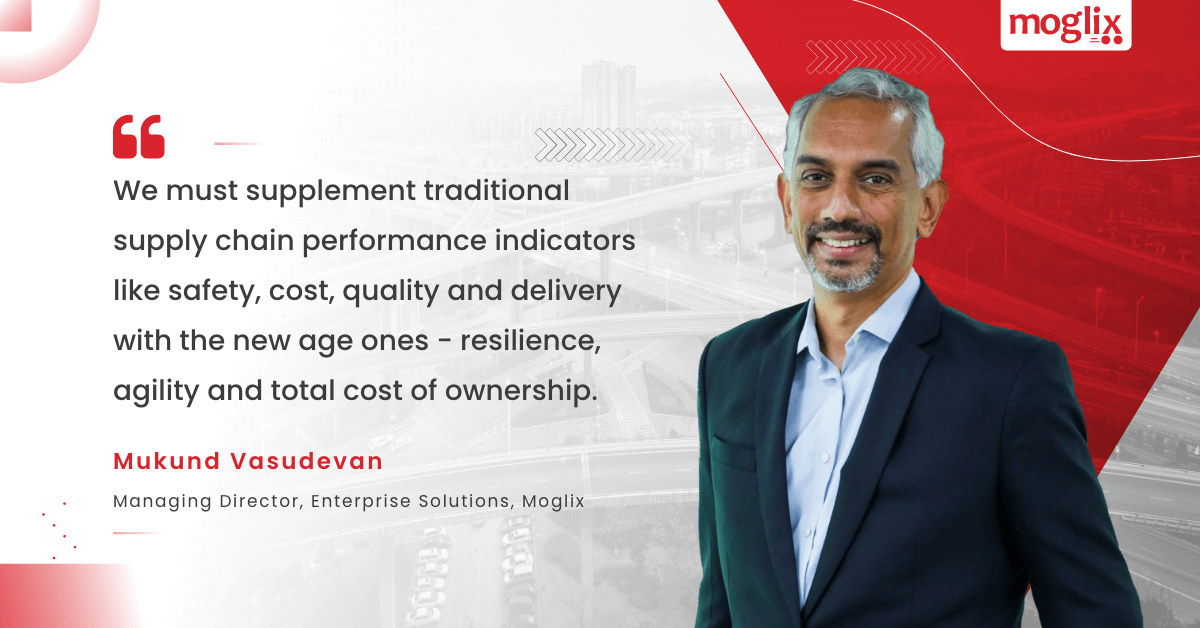
Reengineering the Automotive Supply chain
In 1982, Maruti Udyog and Suzuki signed a historical joint venture which changed the landscape of the Indian automobile sector forever. Nearly four decades later, in 2019, India is set to become the 4th largest automobile market in the world. It produces about 4.5 million vehicles annually (80% passenger and 20% commercial). The industry employs more than three crore people and contributes more than 7% to the overall GDP of India.
Cut to 2022, the industry is recovering from a torrid two-year period of material shortages, flagging customer demand and underutilized production capacity due to Covid. According to SIAM, 2021 was the worst performing year for Indian automobile sales in a decade, with only 17.51 million units sold.
India – A beacon of light in the gloomy world of economic turmoil

India – A beacon of light in the gloomy world of economic turmoil
On the occasion of 76th Independence day, Rahul Garg talks about India’s unprecedented growth.
On her diamond jubilee of Independence, India is setting the pace for science, technology, manufacturing and a collective rise in the quality of living for the world to follow. When we won our independence in 1947, the share of national investment in science and technology was 0.1 per cent of the GDP. After a fractious partition and centuries of a colonial hangover, we immersed ourselves into a mode of nation-building that can serve as an example for any young nation todav.
Digital nirvana enabled by startups
As more quintessential Indian consumers shift to a digitally native approach, startups are fulfilling this transformation by addressing the consumer experience gap. The B2B and D2C category provides a secondary business substrate to a new generation of creators with unlimited reach. Startups are at the heart of India’s service-oriented economy’s transformation into a product-led behemoth.
Moglix- Fueling the Next Generation of Digital Supply Chain
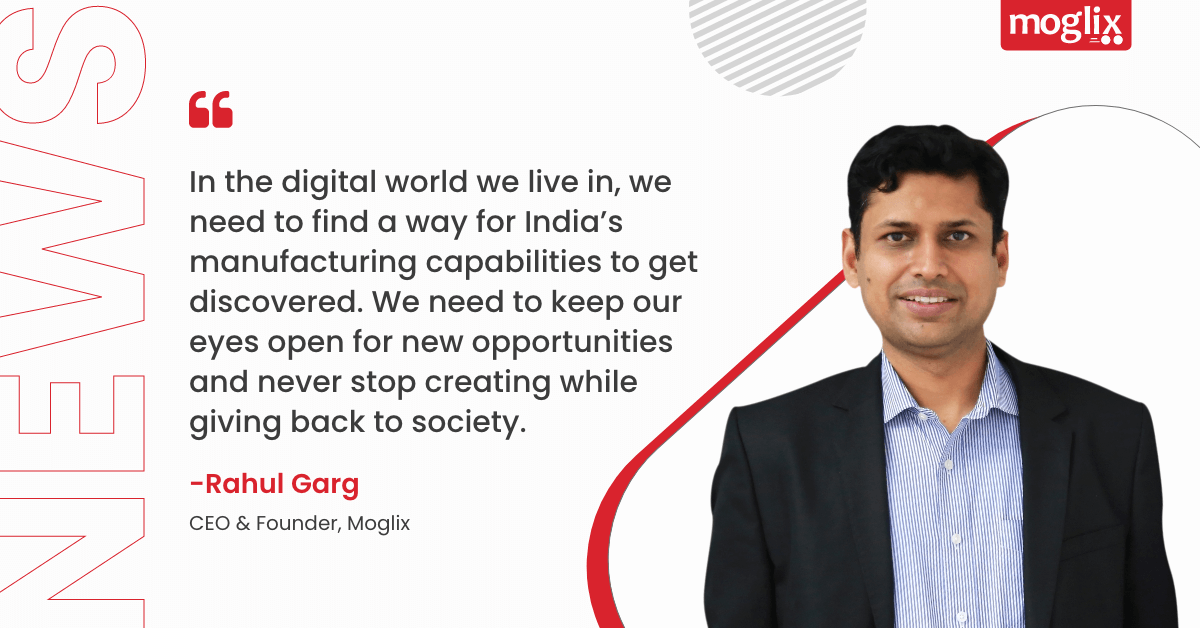
Moglix- Fueling the Next Generation of Digital Supply Chain
Rahul Garg, CEO and Founder recently shared his vision
Moglix is an ecommerce company intensively inclined towards helping business procure industrial supplies, in particular MRO, safety, electricals, lighting, cleaning and housekeeping, office stationary and supplies, power tools and many more business essentials.
”
Talking about the spectrum Moglix covers, Founder and CEO, Rahul Garg said: “Today, we serve 5 million MSMEs and over 1,000 global enterprises to digitise their procurement and supply chain at more than 3,000 plants across auto, pharma, chemical, infrastructure, metals and mining, oil and gas, FMCG and many more sectors.”
Moglix On A Mission to give back to the Community of Armed Forces, Announces Internship Program

Moglix On A Mission to give back to the Community of Armed Forces, Announces Internship Program
Moglix has launched Shaurya, a 3-month internship program in supply chain and procurement for the children of armed forces personnel of all three wings namely, the Indian Army, the Indian Air Force, and the Indian Navy.
The internship program will provide a platform to the children of defence personnel to get exposure to the functioning of the new age supply chain industry for three months.
Introduced on the occasion of Azadi Ka Amrit Mahotsav that marks the completion of 75 years of India’s independence, Rahul Garg, Founder & CEO, Moglix, said, “We have envisaged this internship program to give back to the community of armed forces personnel by enabling access to career opportunities in the supply chain industry for their children. Candidates with relevant educational background and a zeal for the supply chain industry will become future ready through this program,” he added.
In search of holy grail of employee wellbeing – Workplace Safety
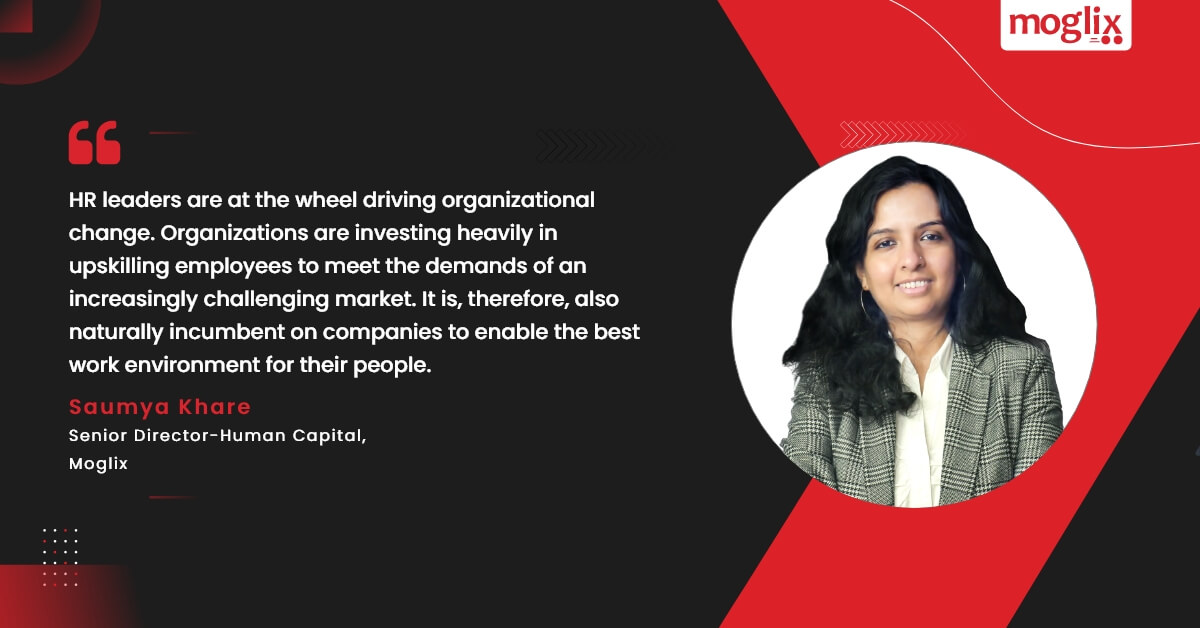
In search of holy grail of employee wellbeing – Workplace Safety
The rate of change in the workplace is at an all-time high. We all know that change is inevitable and necessary to stay ahead of the competition, but change can induce fatigue across all workforce levels. Gartner’s 2022 report on Top HR Priorities lists change management and redesigning the organisation to be future-ready as critical focus areas for HR leaders.
An excellent first step for talent leaders at organizations’, both big and small, is to define what constitutes employee safety and well-being. A few parameters that can help determine this can be:
1. The nature of work – implications of employee safety for a heavy industry manufacturing facility and a large IT firm are obviously different. The correlation between the business model and employee behavior is affected by nuances like a field workforce, travel, distributed work facilities and man-machine interaction.
2. The intensity of work – Some roles can be more demanding and have longer-lasting implications on people’s physical and mental states. organisations need to be mindful of how much stress various roles can generate.
The concept of Zen derived from Mahayana Buddhism is based on strict principles and virtues, and yet, it retains fluidity to allow disciples to achieve a higher state of mind. Similarly, organisations can seamlessly tie workplace safety and employee well-being with their purpose and culture
